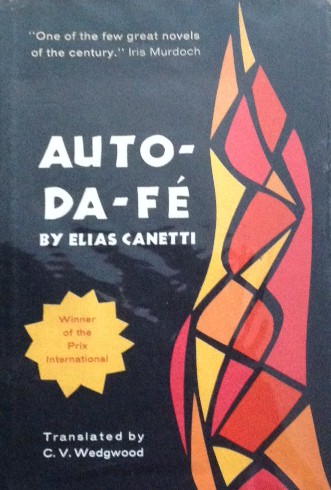Inspiring Older Readers
 posted on 02 Sep 2018
posted on 02 Sep 2018
Auto Da Fé by Elias Canetti
Elias Canetti (1905 – 1994) belonged to that ever dwindling band of twentieth century writers and thinkers who might be called European public intellectuals. Born in Bulgaria, he lived at various times, in Germany, Britain and Austria – moving as the tectonic plates of European politics shifted around him. He wrote essays, sociology, anthropology, drama and he is probably best known for his seminal work, Crowds and Power, published in 1960. Like much of his work, this was a study influenced by his experience of living in a Europe torn apart by two world wars and the rise of Fascism.
Canetti wrote one novel – translated into English as Auto Da Fé but which was actually titled Die Blendung in the German that Canetti favoured. This translates literally as ‘The Blinding’ or ‘The Bedazzlement’ which is somewhat less dramatic than the English language title but, I think, considerably more accurate.
This is a big book in every sense – over 500 pages, densely written, packed with characters and detail and tackling some huge philosophical issues. At one level it’s a book about human failings and weaknesses – greed, delusion, madness – but it is also an allegory of the European condition in the twentieth century. How, Canetti seems to be asking, did it come to this? Why has humanity discovered the lesser part of itself to be more desirable than decency, moderation and social cohesion? It’s no accident, he implies, that the twentieth century is the age of the psychiatrist.
Peter Kien is a distinguished, reclusive sinologist living in Germany between the wars but he’s also a bibliomaniac – his love affair with books has tipped into a mania and he uses the relationship he has developed with his library as a wall to keep out outsiders. In fact he uses his books as a form of magical thinking – wherever he goes he has to take with him, in a briefcase, a carefully selected choice of volumes from his shelves to protect him from the outside world.
Kien has a housekeeper – Theresa - to look after his Spartan needs. He lives off a private inheritance and he’s careful to ensure that the boundaries between him and his domestic help are kept clearly defined. But his desire to ensure his library is properly looked after seduces him into the misguided view that his housekeeper might make him a good wife – something we, as readers, see immediately is a huge mistake. And so it turns out to be – she is grasping, avaricious, stupid and immediately starts scheming to get her hands on what she supposes is his vast fortune.
Kien, it transpires, isn’t so rich after all. What’s left of the inheritance is being eaten up by his book-buying habits and his flat and library are really pretty much all he has. Theresa eventually manages to evict Kien from his home and this triggers his dissent into the social underbelly of Germany between the wars.
The unworldly Kien, whose mental state is deteriorating rapidly, is guided further into the underworld by a dwarf – Fischerle - with an obsessive interest in chess and a desire to be a Grand Master. Nothing and no-one must be allowed to get in his way – he will use and abuse people to get what he wants. And this becomes the dominant characteristic of everyone Kien encounters in the second half of the book – they are monomaniacal and prepared to do anything in pursuit of their gratification. As a study of the totalitarian mind-set, this is disturbing and visceral stuff.
Kien also has a brother, Georges, who is an eminent psychiatrist and who Fischerle eventually sends for in an attempt to help prevent Kien’s further decline into madness. But Georges attempts to help only serve to make things worse and the final apocalyptic scenes – Kien and the library consumed by fire – gives the book its English title (auto da fé being defined by Websters as 'the ceremony for pronouncing judgment by the Inquisition which was followed by the execution of sentence by secular authorities; broadly : the burning of a heretic;).
This is an emotionally draining book to read but it is undoubtedly a very great piece of literature. Canetti creates a claustrophobic atmosphere – especially in the first half of the book as Kien and Theresa struggle for dominance – and the expectation and threat of violence, emotional and physical, is ever present. For anyone interested in the European mind between the two world wars and the conditions required for the rise of Fascism, this is a book that you must read.
A paperback with the C.V. Wegewood translation is still in print and you should be able to get a copy for under £10. It would be a wise investment.
Terry Potter
September 2018